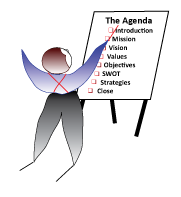
Facilitation Skills in Business and in Life | Gary Rush Facilitation
In 2007, the United Nations released a report entitled,“Participatory Dialogue: Towards a Stable, Safe, and Just Society for All”. The report also presents a range of practical tools and methodologies that fall under the broad umbrella of “participatory dialogue”, serving purposes ranging from increasing mutual understanding through facilitating to create collective visions of the future to joint decision-making and collaborative action, as well as building skills and capacities. The report reinforces facilitation, collaboration, and diversity as critical and essential to society.
I use my Facilitator skills, as a leader, as a member of a group, and always working with others - in business and in life. Why should facilitation skills be of interest to everyone? In learning facilitation skills, we learn "how to":
- Understand and work with a diverse group.
- Be “not in charge”.
- Get others to come together, step through a thought process, and accomplish something.
- Get up in front of people and speak with confidence.
- Engage people so that everyone gets involved.
- Move a group towards consensus.
Understand and work with a diverse group.
To understand, accept, and listen to diverse people is essential. I’ve had the opportunity to deal with people from all over the globe, from different backgrounds, with different views and values, and the differences made life richer. As a Facilitator, you learn "how to" actively listen, and you learn more as a result. When we accept people and listen to what they have to say, we stop judging.
Be “not in charge”.
To not be in charge, requires trust. As a Facilitator, you learn the value of the group – the wisdom of others – to enable others to do the work. Working with a group, as a leader, I’ve learned that dictating is not the answer. Sometimes (many times) it is better to let others be in charge. It lets them know that you trust their abilities. That’s one of the most difficult lessons for a Leader to learn. It’s surprising and humbling when you find that others can actually do a better job at something than you can. We are always greater as a whole than the sum of the parts.
Get others to come together, step through a thought process, and accomplish something.
People need a thought process – “How are we to do this?” I'm talking about processes that help structure the thinking of a group. In preparing for meetings/workshops, Facilitators learn "how to" design a thought process that enables a group to accomplish their task. Understanding processes and "how to" design processes gives you direction to ensure well thought-out solutions.
Get up in front of people and speak with confidence.
This is the #1 fear – fear of public speaking. Facilitators learn "how to" manage their fear to expressively convey a clear message. When we allow these fears to control us, we lose our ability to perform. By the way, you never overcome the fear – you simply learn to manage it.
Engage people so that everyone gets involved.
In groups, do a few people dominate the discussion? Are those who don’t participate too shy or are their ideas less valuable? Better ideas come when everyone is involved. Facilitators learn "how to" ensure that no one is excluded and that all are encouraged to participate. Whether it’s an exercise or a probing question, getting everyone involved increases the quality of the discussion and the quality of solutions.
Move a group towards consensus.
Consensus is a great concept. Consensus means that you can say, "I can support the decision." Whenever I’m working with a group, I know that I have to get everyone to participate (diverge), disagree (struggle), and then move to consensus (converge). Facilitators learn "how to" use this thought process in any capacity to guide groups to consensus.
So, why learn Facilitation skills? Because they are a set of behavioral skills that through engaging, empowering, and collaborating, enhance job performance. ![]()

